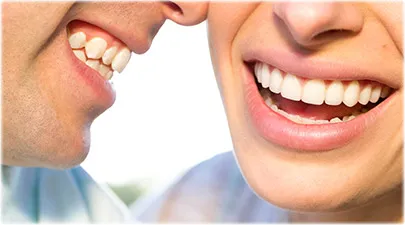Quiz: What Do You Know About Your Teeth?

An orange a day prevents tooth decay.
True
False
An orange a day prevents tooth decay.
Citrus fruits are highly acidic. They can wear down the hard outer covering of your teeth, called enamel. That makes your teeth more vulnerable to decay. This doesn't mean you have to skip your morning OJ, though. Just make sure to brush afterward. Ideally you should wait 30 minutes after eating or drinking. And limit acidic drinks, such as coffee or lemonade, for the rest of the day.
If you have a sugary drink, drink it quickly instead of sipping it all afternoon -- and brush afterward, if you can.

Bacteria that live on your teeth are a major cause of:
Bad Breath
Cavities
Both
Bacteria that live on your teeth are a major cause of:
Bacteria thrive on bits of food on and in between your teeth, and they clump together to form a sticky film called plaque. Acids that come from bacteria in plaque wear away tooth enamel and can eventually create a hole or cavity. Plaque also causes gum disease, which can leave you with stubborn bad breath. Brush your teeth twice a day and floss and rinse with an antiseptic mouthwash at least once to keep plaque at bay.

When you're craving sweets, dried fruit is a tooth-friendly alternative to candy.
True
False
When you're craving sweets, dried fruit is a tooth-friendly alternative to candy.
Dried fruit is sticky, which means it stays on the teeth longer than some sweets. This provides an ongoing source of sugar that fuels bacterial growth. So if you're a fan of trail mix, rinse your mouth with water after snacking. Brush and floss as soon as possible.

In infants, baby teeth may appear as early as:
Birth
3 months
6 months
In infants, baby teeth may appear as early as:
About 1 in 2,000 babies is born with visible teeth. In the typical baby, all 20 primary teeth are fully formed at birth, but they don't start emerging from the gums until around 6 months of age.

Baby teeth are whiter than adult teeth.
True
False
Baby teeth are whiter than adult teeth.
The enamel on primary teeth is thinner, making them appear whiter than permanent teeth. The color difference may be noticeable when kids have a mix of baby and adult teeth.

Dental sealants are only for kids.
True
False
Dental sealants are only for kids.
Whether you're a child or an adult, your toothbrush can't reach all the way into the grooves of your teeth. That means some food and plaque will remain despite your best efforts to take care of your teeth and gums. Dental sealants coat the chewing surfaces to seal out plaque. One application will usually protect the teeth from decay for several years.

A black hairy tongue comes from:
A serious medical illness
A harmless growth of bacteria
Too much coffee
A black hairy tongue comes from:
In some people, tiny projections on the tongue's surface grow longer than usual. This layer of "fur" harbors bacteria, which makes the tongue look darker. Brushing, flossing, and rinsing with an antiseptic mouthwash regularly can control the bacteria and restore the tongue's normal appearance.

It's normal for teeth to be sensitive to hot and cold foods.
True
False
It's normal for teeth to be sensitive to hot and cold foods.
If hot or cold sensations are disturbing the nerve, it's a sign that the tooth is losing its protective coating. This can happen as a result of cavities, worn fillings, gum disease, receding gums, or a fractured tooth. It can also be a sign of other things besides worn teeth. A bad bite (malocclusion) or clenching and grinding can lead to sensitive teeth. So can recent trauma or dental work. There are effective treatment options for sensitive teeth. So see your dentist if your teeth are sensitive.

"Whitening" toothpastes work by:
Removing stains from your teeth
Bleaching the tooth enamel
Coating the teeth with a film
"Whitening" toothpastes work by:
Whitening toothpastes are made with ingredients that scrub surface stains from the teeth. They don't change the baseline color of your tooth enamel. If you want to get your teeth whiter than your enamel color, talk to your dentist about an in-office or at-home bleaching treatment.

If you knock your tooth out, putting it in milk will help preserve it.
True
False
If you knock your tooth out, putting it in milk will help preserve it.
Yes, true! It's important to keep the tooth moist until you can get to the dentist's office or emergency room. The best options are to put the tooth back in its socket without touching the root or keep it in between the cheek and gums. If neither is possible, store the tooth in milk and head to the dentist right away.